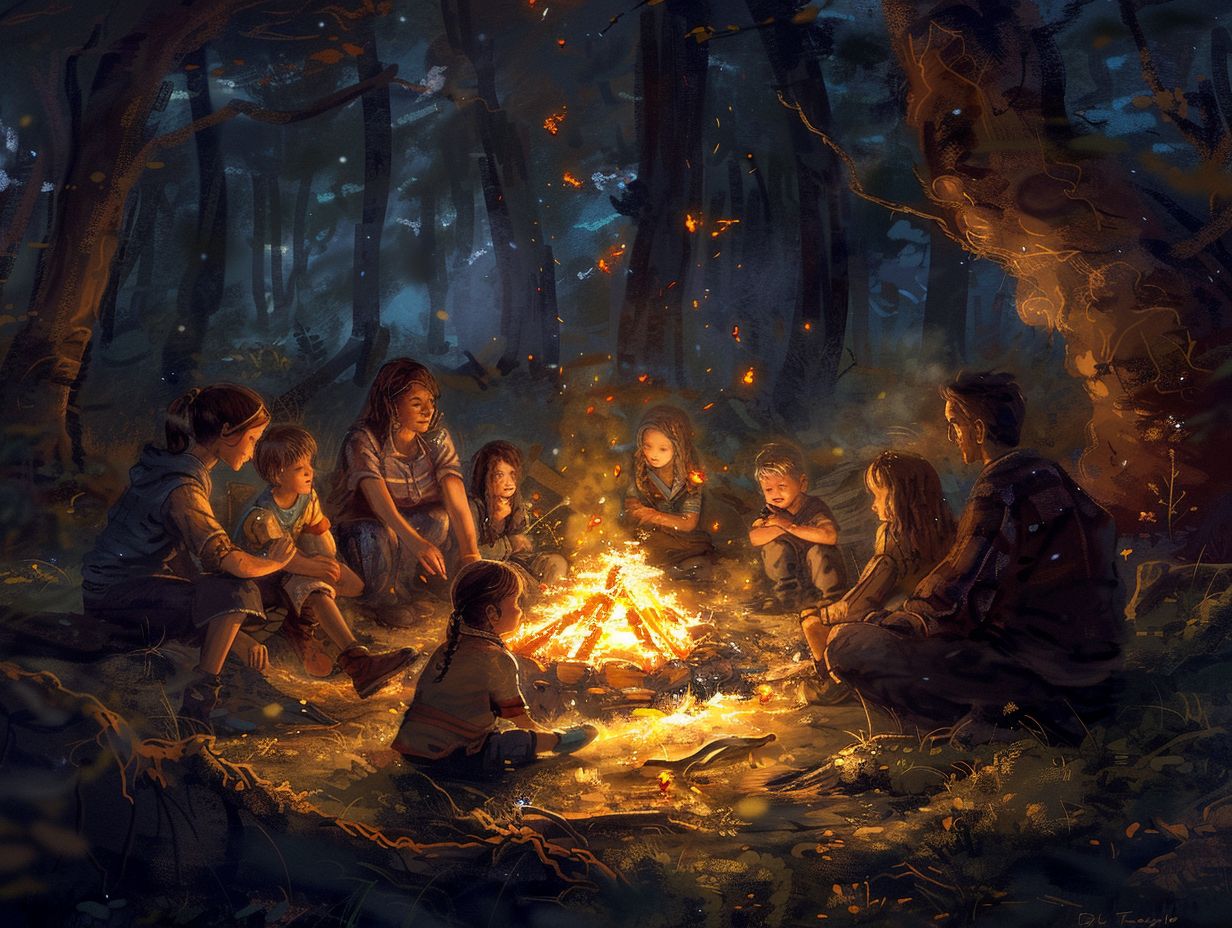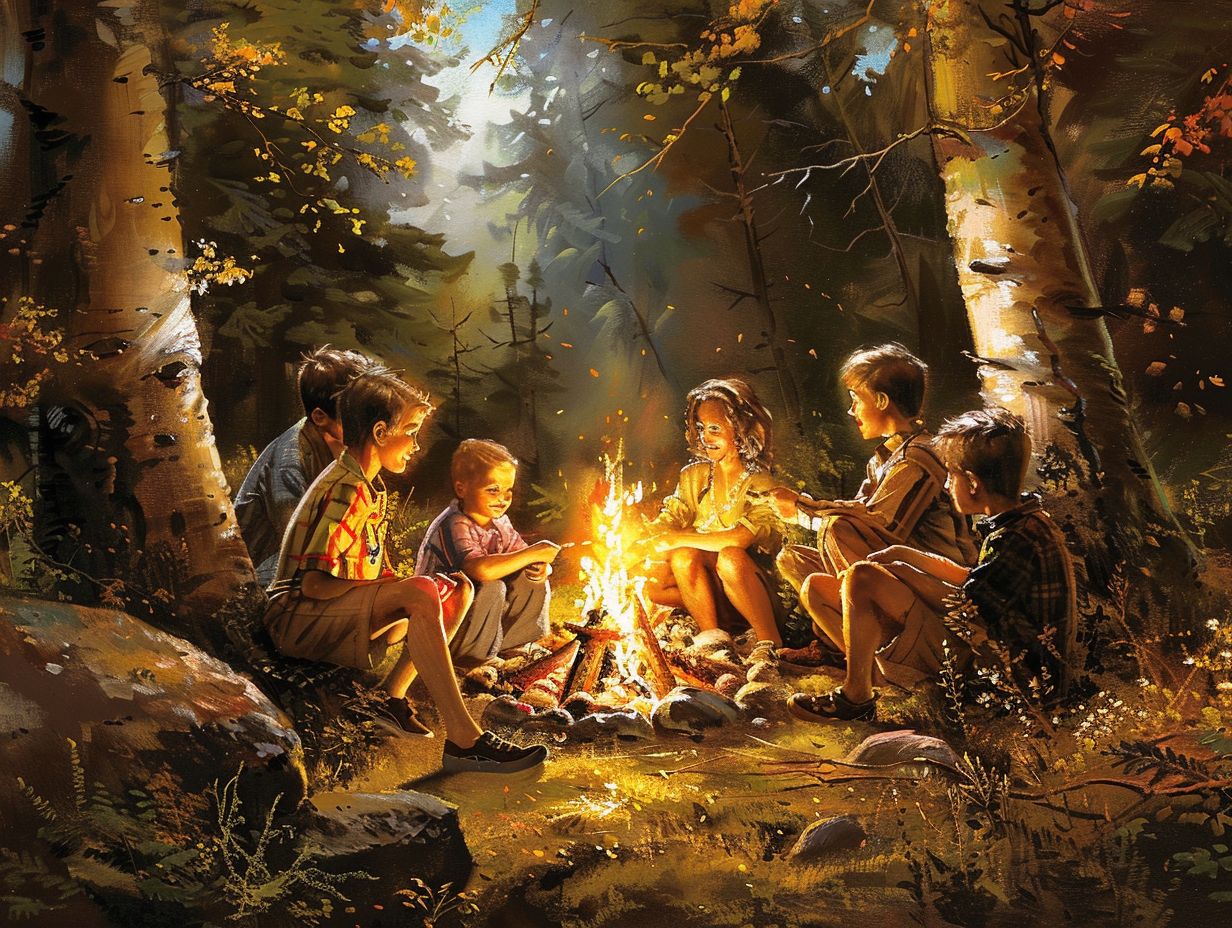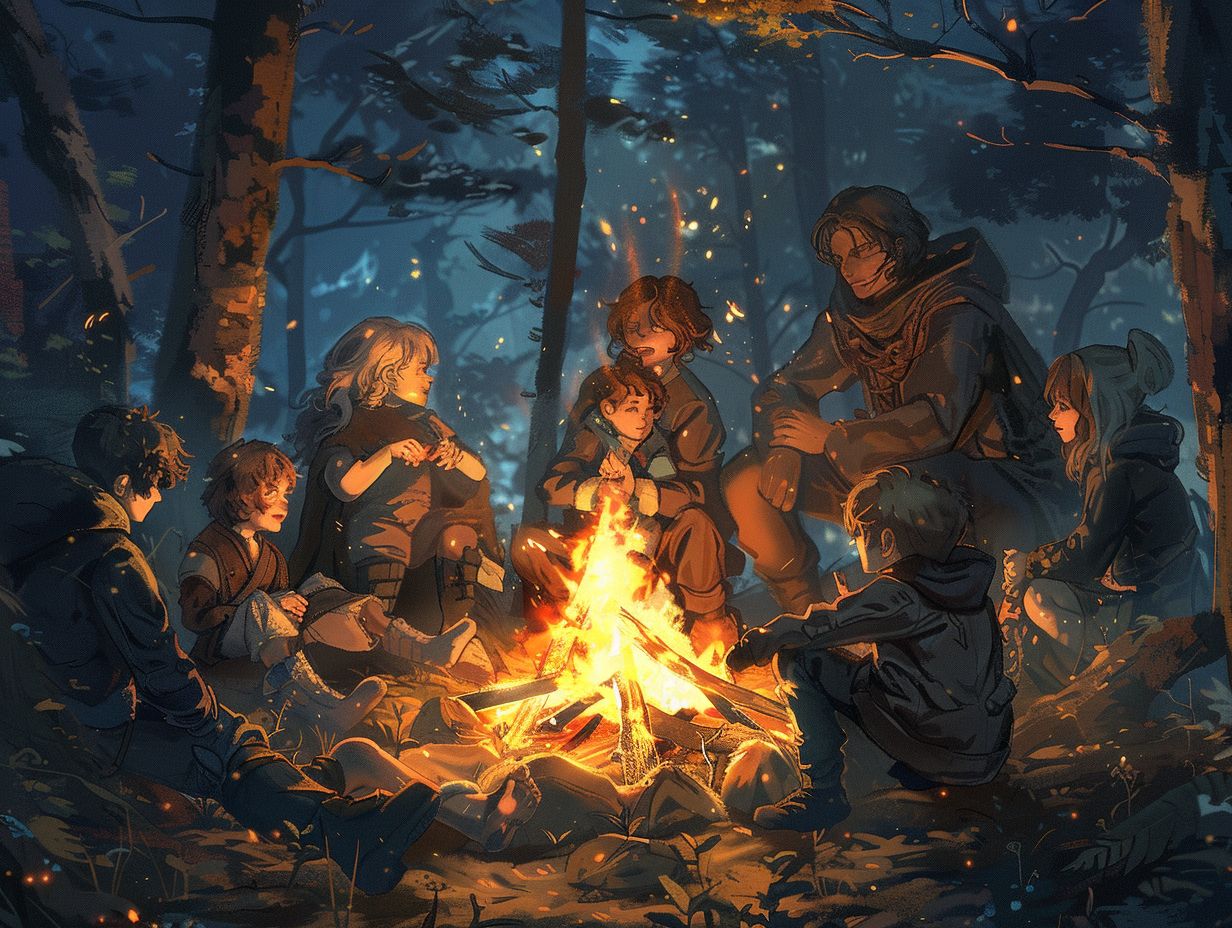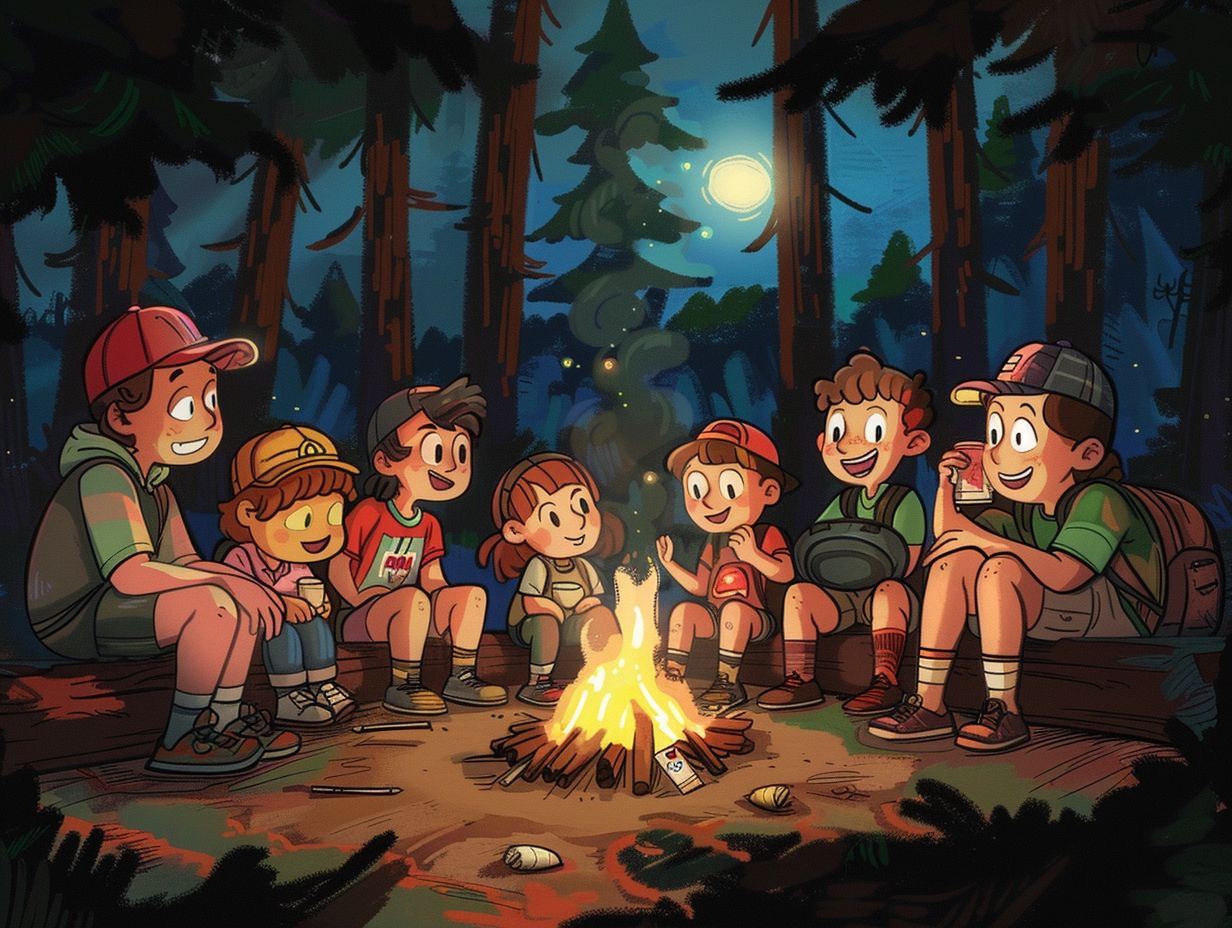Are you in search of a fun and educational experience for your children this summer?
Educational camping trips offer a wonderful blend of outdoor adventure and valuable learning experiences.
This article will delve into the advantages of educational camping trips for kids, outline how to select the ideal location, and offer advice on trip preparation.
Additionally, we will address the incorporation of activities, developing a learning itinerary, and reflecting on the overall experience.
Let’s commence the process of planning an enriching camping trip for your children!
Key Takeaways:

- Educational camping trips provide developmental and learning benefits for kids, making them a valuable experience for their growth.
- When choosing a location for an educational camping trip, consider factors such as accessibility, safety, and opportunities for nature and cultural activities.
- To make the trip educational, incorporate activities like nature exploration, learning about local culture and history, and setting specific goals and objectives to guide the learning process.
Benefits of Educational Camping Trips for Kids
Educational camping trips offer you the opportunity to explore the wonders of nature, engage in educational activities, and acquire valuable life skills while immersing yourself in the great outdoors.
These trips provide hands-on learning experiences that traditional textbooks cannot replicate. By interacting with wildlife and plants in their natural habitats, you will develop a deeper understanding and appreciation for the environment. Camping also fosters a sense of independence and self-reliance as you learn to set up tents, build campfires, and navigate the outdoors.
Educational camping trips often incorporate guided nature walks, environmental workshops, and conservation projects, providing you with a comprehensive educational experience that seamlessly merges adventure with learning.
Developmental and Learning Advantages
Educational camping trips for kids offer a range of developmental and learning benefits, encouraging interest in wildlife, plants, geology, astronomy, and ecology. These trips enable children to engage with the natural environment, providing hands-on experiences that go beyond what textbooks can offer.
Through activities such as hiking and stargazing, young individuals not only gain knowledge about various ecosystems but also cultivate an appreciation for the beauty of nature. Camping nurtures independence and resilience in children as they tackle outdoor challenges, improving their problem-solving abilities and bolstering their confidence.
Interacting with the environment in this manner sparks a lasting concern for sustainability and conservation, shaping a new generation of environmentally conscious individuals.
Choosing a Location for an Educational Camping Trip
Choosing the right location for an educational camping trip is essential to ensure that children have access to engaging educational activities within the beauty of nature and the great outdoors.
A carefully selected camping site can offer numerous opportunities for children to learn about ecology, wildlife, astronomy, and conservation through hands-on, experiential activities.
Encouraging children to explore the surrounding environment can enhance their curiosity and foster appreciation for the natural world, establishing a profound connection with the earth.
A location that features diverse ecosystems such as forests, meadows, and rivers can ignite interest in various habitats and species, facilitating a well-rounded understanding of ecological balance and biodiversity.
Factors to Consider
When deciding on a location for an educational camping trip, you should consider several factors to ensure that the experience is enriching, educational, and aligned with the interests and learning goals of the children.
Proximity to nature plays a crucial role in igniting children’s curiosity and fostering a deeper connection with the environment. Being surrounded by the natural world offers endless opportunities for exploration and hands-on learning.
Choosing a campsite that provides access to educational activities such as guided nature walks, wildlife presentations, and stargazing sessions can enhance the overall experience.
Safety considerations are paramount, including adequate supervision, emergency preparedness, and secure campsites, to ensure a worry-free environment for both children and educators.
Preparing for the Trip

Effective preparation for an educational camping trip involves gathering essential supplies, packing appropriate gear, and ensuring that all arrangements are in place for a successful and enriching experience in nature.
Before embarking on the journey, it is crucial to pack educational materials such as field guides, star maps, and nature scavenger hunt sheets to encourage learning opportunities in the great outdoors.
Selecting suitable gear tailored for children, like sturdy yet comfortable hiking boots, waterproof clothing, and child-sized rucksacks, is essential for their safety and enjoyment.
Organising logistics, such as meal planning, campsite reservations, and transport, helps streamline the trip and ensures a smooth and well-coordinated adventure for all participants.
Essential Supplies and Gear
Ensuring that your children are well-prepared for an educational camping trip requires gathering essential supplies and equipment. These items will enable them to participate in various nature-related activities and learning experiences.
One key item to include in their equipment is a reliable tent, providing shelter and comfort during their outdoor stay. It’s also important to have sleeping bags that are suitable for different weather conditions to ensure a good night’s sleep. Educational materials such as field guides, binoculars, and maps can greatly enhance their exploration of nature and learning about local flora and fauna.
Additionally, safety equipment like first aid kits, emergency whistles, and torches are crucial in case of unexpected situations. Outdoor equipment like walking boots, rucksacks, and camping stoves are essential for navigating trails and preparing meals.
Activities to Incorporate on the Trip
During an educational camping trip, you can expect a variety of activities that combine nature exploration with valuable learning opportunities, resulting in a multifaceted experience that captivates children with the marvels of the outdoors.
When traversing nature trails, you will have the opportunity to observe a diverse range of plant and animal species in their natural settings. These encounters often ignite curiosity and cultivate an appreciation for the environment.
Participating in wildlife spotting sessions allows children to firsthand observe various creatures and their behaviours, fostering a deeper comprehension of ecosystems.
Nighttime stargazing activities offer a breathtaking view of the universe, prompting discussions on astronomy and the enigmas of outer space.
Engaging in hands-on learning activities, like building a campfire or identifying constellations, further enhances the educational value of the camping trip.
Nature Exploration and Learning Opportunities
Nature exploration on an educational camping trip provides you with unparalleled learning opportunities to discover wildlife, study plants, explore geology, delve into astronomy, and understand ecological systems in a hands-on outdoor setting.
Being immersed in nature will foster a deep appreciation for the environment and encourage curiosity about the interconnectedness of living organisms and their habitats. Observing animals in their natural habitats will teach you about biodiversity and the importance of conservation.
Identifying different plant species and learning about their unique characteristics will enhance your botanical knowledge and nurture a sense of wonder for the natural world. Exploring geological formations firsthand will help you grasp concepts like rock formations and land erosion, fostering an interest in earth sciences.
Stargazing under the open sky during camping trips will provide you with a unique opportunity to learn about the vastness of the universe and different celestial bodies, sparking fascination with astronomy.
Examining ecosystems and their delicate balance in a real-world setting will illustrate the impact of human activities on the environment, instilling a sense of responsibility and stewardship for nature in your mind.
Cultural and Historical Activities
Incorporating cultural and historical activities into educational camping trips enables you to gain insights into the past, explore archaeological sites, and appreciate the rich history of the natural and cultural landscapes you encounter.
These experiences not only provide a fun and interactive way for children to learn but also foster a deeper connection to the world around them. When you participate in field trips to historical sites, you have the opportunity to witness history come to life, sparking your curiosity and imagination.
Learning about archaeology during camping trips cultivates a sense of appreciation for preserving heritage and understanding the origins of civilisations. Such activities not only enrich your knowledge but also instil a respect for diverse cultures and traditions.
Creating a Learning Plan for the Trip

When developing a comprehensive learning plan for an educational camping trip, you should start by setting clear goals and objectives that align with the educational outcomes and experiences desired for the children during their time in nature. Consider the age group of the participants and their prior knowledge to tailor the learning activities accordingly.
Identify key learning goals, such as environmental awareness, teamwork, and survival skills, to structure the educational plan around a range of subjects. Incorporate outdoor activities like nature walks, wildlife observation, and outdoor cooking to provide hands-on learning experiences and foster a deeper connection with the natural environment.
Integrate reflective exercises and journaling to enhance the educational value of the camping trip by encouraging self-discovery and critical thinking.
Setting Goals and Objectives
When planning an educational camping trip for children, it is crucial to set clear goals and objectives. This ensures that the children engage in targeted learning experiences, participate in meaningful activities, and make the most of the educational benefits that nature has to offer.
By defining specific learning outcomes, the children can concentrate on developing essential skills like teamwork, problem-solving, and an appreciation for the environment during the camping trip.
These objectives create a structured approach to enriching their understanding of nature, survival techniques, and outdoor exploration. Moreover, this process fosters personal growth, independence, and self-reliance as the children navigate through new challenges and experiences.
Establishing educational achievements as goals helps instil a sense of accomplishment and motivation, transforming the camping trip into a valuable and enriching learning experience.
Reflecting on the Experience
Reflecting on your educational camping trip experience involves debriefing with the children, discussing lessons learned, and evaluating the impact of the trip on their learning, personal growth, and connection to nature.
The debrief sessions after a camping trip play a vital role in solidifying the experiential learning that took place outdoors. By sharing their experiences and insights gained during the trip, the children not only reinforce their own understanding but also contribute to a collaborative learning environment.
These discussions are not just about recounting adventures but also about diving into the new knowledge and skills acquired. Reflecting on personal growth and learning outcomes helps you comprehend the significance of your experiences and fosters a deeper connection with nature.
Debriefing and Discussing Lessons Learned
Engaging in debriefing sessions and discussions to review the lessons learned from an educational camping trip allows you to reflect on your experiences, share insights, and solidify your understanding of nature, science, and the environment.
Through these reflective discussions, you can delve deeper into the various outdoor activities you engaged in, such as hiking, bird watching, and stargazing, connecting these experiences to broader concepts like biodiversity and sustainability.
The debriefing process also fosters a sense of appreciation for the natural world’s beauty and instils a greater sense of responsibility towards preserving and protecting our planet for future generations.
Frequently Asked Questions
What are some ways to make a camping trip educational for kids?

1. Plan educational activities: Incorporate activities such as nature scavenger hunts, wildlife observation, and outdoor experiments to make the trip both fun and educational.
2. Learn about local flora and fauna: Use guidebooks or online resources to teach children about the plants and animals they may encounter during the trip.
3. Teach survival skills: Teach kids basic survival skills like building a fire, using a compass, and identifying edible plants to help them develop important life skills.
4. Use nature as a classroom: Take advantage of the natural surroundings to teach kids about ecosystems, weather patterns, and other scientific concepts.
5. Involve kids in planning: Let children be a part of planning the trip by researching the destination, making packing lists, and setting up camp. This can help foster a sense of responsibility and independence.
6. Keep a nature journal: Encourage kids to document their observations and experiences in a nature journal. This can be a great way to practice writing and drawing skills while also reflecting on the trip.
Why is it important to make a camping trip educational for kids?
Making camping trips educational for kids can help them develop a deeper appreciation for nature, learn important skills, and foster a love for outdoor activities. It also provides a unique opportunity to learn outside of a traditional classroom setting.
What are some benefits of involving kids in planning a camping trip?
Involving kids in the planning process can help them feel more invested in the trip and develop important skills such as decision-making, organization, and budgeting. It also promotes teamwork and communication within the family.
How can I make a camping trip educational for kids of different ages?
Adjust the activities and information to suit the age and abilities of each child. For younger children, focus on basic concepts like animal identification and sensory exploration. For older kids, you can introduce more complex topics and activities such as map reading or outdoor cooking.
Can I make a camping trip educational even if I’m not an outdoor expert?
Yes, absolutely! You don’t need to be an expert to make a camping trip educational for kids. Use resources like guidebooks, online information, or local nature centers to learn alongside your children. You can also involve them in researching and planning for the trip.
How can I make sure my kids are safe while learning on a camping trip?
Prioritize safety by teaching kids about basic camping rules, setting boundaries, and supervising them during activities like fire building or hiking. Encourage them to ask questions and communicate any concerns they may have. It’s also important to be prepared for any emergencies and have a first-aid kit on hand.



